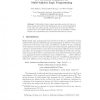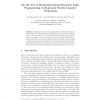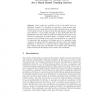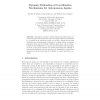EPIA
2001
Springer
13 years 9 months ago
2001
Springer
Abstract. Multi-adjoint logic program generalise monotonic logic programs introduced in [1] in that simultaneous use of several implications in the rules and rather general connect...
EPIA
2001
Springer
13 years 9 months ago
2001
Springer
EPIA
2001
Springer
13 years 9 months ago
2001
Springer
This paper explores the applicability of the new paradigm of Multi-dimensional Dynamic Logic Programming to represent an agent’s view of the combination of societal knowledge dyn...
EPIA
2001
Springer
13 years 9 months ago
2001
Springer
The goal of this paper is to further investigate the extreme behaviour of the proportional membership model (FCPM) in contrast to the central tendency of fuzzy c-means (FCM). A dat...
EPIA
2001
Springer
13 years 9 months ago
2001
Springer
EPIA
2001
Springer
13 years 9 months ago
2001
Springer
Dealing with temporality on actions presents an important challenge to AI planning. Unlike Graphplan-based planners which alternate levels of propositions and actions in a regular ...
EPIA
2001
Springer
13 years 9 months ago
2001
Springer
EPIA
2001
Springer
13 years 9 months ago
2001
Springer
EPIA
2001
Springer
13 years 9 months ago
2001
Springer
Abstract. This paper presents a formal framework within which autonomous agents can dynamically select and apply different mechanisms to coordinate their interactions with one ano...
EPIA
2001
Springer
13 years 9 months ago
2001
Springer
Organisations can be defined as a set of entities regulated by mechanisms of social order and created by more or less autonomous actors to achieve common goals. Multi-agent systems...




